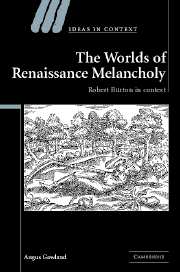Book contents
Conclusion: Robert Burton's melancholy
Published online by Cambridge University Press: 13 January 2010
Summary
Burton's great accomplishments in the Anatomy were not his critical appraisal of or additions to the endogenous scholarly theory of melancholy. As we have seen, the latter in particular were few and far between. Rather, they derived from the expansive and flexible manner in which he applied that theory to his surroundings: his exploitation of the medical-pathological category of religious melancholy to give scientific substance to a polemical analysis of contemporary spiritual politics; his employment of the moral-psychological dimension of melancholy to ground a wide-ranging critique of the condition of the domestic body politic; his exploration of the physiological and psychological intricacies revealed by writings on melancholy as a means of delivering a satirical and sceptical humanistic commentary on the limitations of speculative knowledge; and his use of the conceptual resources carried by the theory of melancholy generally to express adherence to the intellectual culture of Christian humanism and lament its contemporary degradation.
It was undeniably a complex and multifaceted polymathic enterprise undertaken by an author with a ‘roving humor’ (1.4.3), and this was reflected in the diversity of its seventeenth-century reception in England. For many, the Anatomy served its purpose as an encyclopaedic source of knowledge that presented the fruits of European medical-scientific learning about melancholy in a clear and accessible form. The astrological physician Richard Napier, for instance, appears to have used the book as a straightforward medical textbook and treated his patients in accordance with its recommendations.
- Type
- Chapter
- Information
- The Worlds of Renaissance MelancholyRobert Burton in Context, pp. 295 - 301Publisher: Cambridge University PressPrint publication year: 2006

